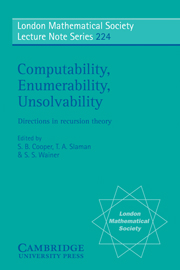Book contents
- Frontmatter
- Contents
- Preface
- Resource bounded genericity
- On isolating r.e. and isolated d-r.e. degrees
- A characterisation of the jumps of minimal degrees below 0′
- Array nonrecursive degrees and genericity
- Dynamic properties of computably enumerable sets
- Axioms for subrecursion theories
- On the ∀ ∃ - theory of the factor lattice by the major subset relation
- Degrees of generic sets
- Embeddings into the recursively enumerable degrees
- On a question of Brown and Simpson
- Relativization of structures arising from computability theory
- A Hierarchy of domains with totality, but without density
- Inductive inference of total functions
- The Medvedev lattice of degrees of difficulty
- Extension of embeddings on the recursively enumerable degrees modulo the cappable degrees
- APPENDIX: Questions in Recursion Theory
Degrees of generic sets
Published online by Cambridge University Press: 23 February 2010
- Frontmatter
- Contents
- Preface
- Resource bounded genericity
- On isolating r.e. and isolated d-r.e. degrees
- A characterisation of the jumps of minimal degrees below 0′
- Array nonrecursive degrees and genericity
- Dynamic properties of computably enumerable sets
- Axioms for subrecursion theories
- On the ∀ ∃ - theory of the factor lattice by the major subset relation
- Degrees of generic sets
- Embeddings into the recursively enumerable degrees
- On a question of Brown and Simpson
- Relativization of structures arising from computability theory
- A Hierarchy of domains with totality, but without density
- Inductive inference of total functions
- The Medvedev lattice of degrees of difficulty
- Extension of embeddings on the recursively enumerable degrees modulo the cappable degrees
- APPENDIX: Questions in Recursion Theory
Summary
Introduction
We consider genericity in the context of arithmetic. A set A ⊆ ε ω is called n-generic if it is Cohen-generic for n-quantifier arithmetic. By degree we mean Turing degree (of unsolvability). We call a degree n-generic if it has an n-generic representative. For a degree a, let D(≤ a) denote the set of degrees which are recursive in a. Since the set of n-generic sets is comeager, if some property is satisfied in D(≤ a) with a any generic degree, then in the sense of Baire category, we can say that it is satisfied in D(≤ a) for almost every degree a. So the structure of generic degrees plays an important role when we study the structure of D, the set of all degrees. For example, Slaman and Woodin [38] showed that there is a generic degree a such that if f is an automorphism of D and f(a) = a then f is identity. In this paper we mainly survey D(≤ a) when a is n-generic, as well as the properties of generic degrees in D. We assume the reader is familiar with the basic results of degree theory and arithmetical forcing. Feferman [4], Hinman [8], Hinman [9], and Lerman [25] are good references in this area. Odifreddi [29] is a good survey for basic notions and results for forcing and reducibilities. Jockusch [11] is a pioneering work in this area.
Information
- Type
- Chapter
- Information
- Computability, Enumerability, UnsolvabilityDirections in Recursion Theory, pp. 167 - 184Publisher: Cambridge University PressPrint publication year: 1996
Accessibility standard: Unknown
Why this information is here
This section outlines the accessibility features of this content - including support for screen readers, full keyboard navigation and high-contrast display options. This may not be relevant for you.Accessibility Information
- 6
- Cited by
